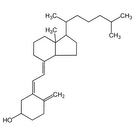Articles in the Headline Category
Headline, News »

Phase 2 trials will begin for a new form of melphalan (Alkeran), a form of low-dose chemotherapy for multiple myeloma patients, made by CyDex Pharmaceuticals, Inc. These studies will compare the effectiveness of CyDex’s new melphalan, Propylene Glycol-Free Melphalan HCL (CDX-353), and GlaxoSmithKline’s Alkeran in multiple myeloma patients who will be undergoing stem cell transplants.
According to CyDex’s press release, the advantages of the new treatment are its one-vial packaging, gentler formula, and increased stability at room temperature. “These …
Headline, News »

For the first time, researchers have sequenced the full multiple myeloma genome.
Sequencing the full multiple myeloma genome enables scientists to discover which genes are present in a myeloma tumor, as well as to determine which genetic regions may harbor mutations. This knowledge will help researchers better understand both myeloma’s development -- how normal plasma cells in the bone marrow transform into cancerous ones – and new, tailored targets for attacking the disease.
This genetic reconstruction project by the Multiple …
Headline, News »

Close relatives of people with multiple myeloma or monoclonal gammopathy of undetermined significance (MGUS) have an increased risk of having MGUS, according to research published in the journal Blood on Thursday. The research found that parents, siblings, and children of people with multiple myeloma or MGUS are 2.6 times more likely to have MGUS than the general population. An MGUS diagnosis is associated with an increased risk of developing multiple myeloma.
Scientists at the Mayo Clinic looked at blood serum …
Headline, News »

Dr. Sagar Lonial, associate professor at the Winship Cancer Institute of Emory University and trained bone marrow physician, recently commented on two studies in the journal Blood that focused on high-risk multiple myeloma.
Lonial, an ad hoc article reviewer for Blood, Cancer Research, and other journals, has a particular interest in molecular therapies for lymphoma and myeloma. His recent research focuses on combinations of novel drugs that could be used to treat the two diseases.
In his article, titled “Risky …
Headline, News »

Vitamin D deficiency may be a significant cause of skeletal complications in multiple myeloma patients, according to a recent study published in the American Journal of Hematology. Skeletal complications, which include hypercalcemia (high calcium levels), bone loss, and osteolytic bone lesions, are a major cause of morbidity in multiple myeloma.
"Bone health is very important for quality of life in patients with myeloma, due to lytic lesions and an increased risk of fracture," explains Dr. Matthew Drake, an author of …
Headline, News »

Celgene Corporation reported yesterday that a Phase 3 clinical trial of Revlimid (lenalidomide) in first-line multiple myeloma patients has produced overwhelmingly positive results. The outcome of the trial, known as MM-015, suggests that Revlimid taken in combination with melphalan (Alkeran) and prednisone, followed by continuous Revlimid, produces significant improvement in progression-free survival.
While Revlimid is already prescribed as a front-line drug for multiple myeloma, it is approved for use only in patients for whom other treatments have …
Headline, News »

A new study appearing in the July 9 issue of Blood discussed a potential therapeutic treatment that focuses on osteoblasts, the cells responsible for bone formation.
Myeloma patients commonly have high serum DKK1 levels, which may decrease with response to therapy for myeloma. DKK1, an important regulator of bone formation, has previously been associated with bone disease in cancers of the esophagus, lungs, prostate, and colon. However, DKK1 has recently emerged as a therapeutic target for suppressed bone formation. The …

